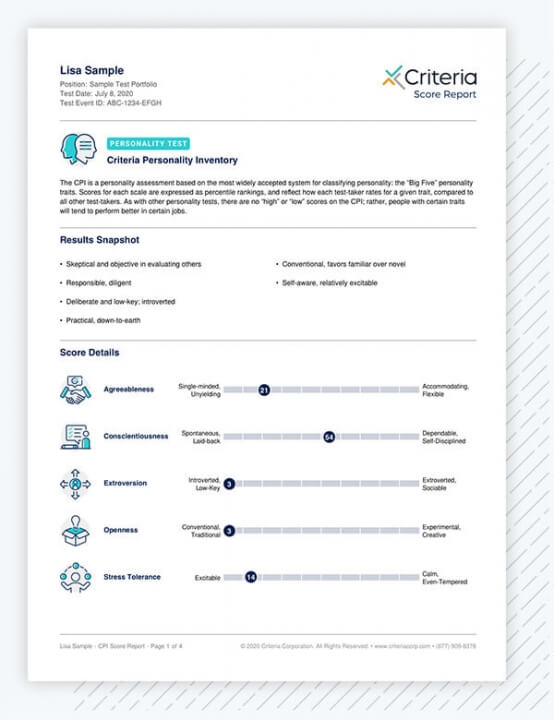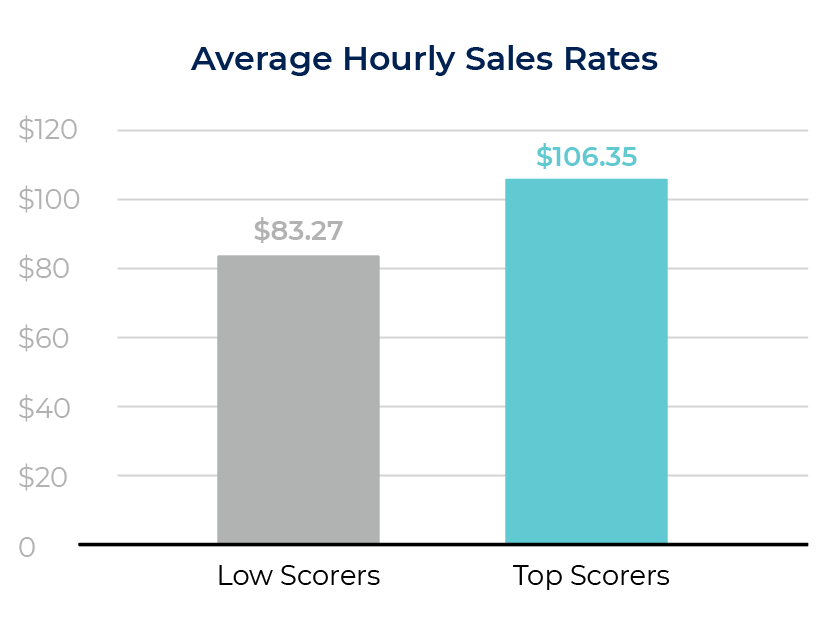Criteria Personality Inventory (CPI)
Measures:
- Agreeableness
- Conscientiousness
- Extroversion
- Openness
- Stress Tolerance
Recommended for:
- As a general personality test, the CPI can be used for any type of role.

Test Description
Personality testing can yield valuable insights into future job performance. The Criteria Personality Inventory (CPI) is a personality inventory grounded in the theory of the most widely accepted taxonomy of personality, the "Big Five" personality traits: Extroversion, Conscientiousness, Agreeableness, Openness, and Stress Tolerance. Research has shown that three of the "Big Five" traits are often linked to job performance: Conscientiousness, Agreeableness, and Extroversion. The Conscientiousness scale has been shown to be correlated to job performance in a wide range of jobs. Agreeableness and Extroversion have been shown to correlate with performance for jobs that require frequent interaction with people.
Score Reports
There are no right or wrong answers on personality tests; however, individuals with certain personality traits may be better suited for some jobs than others. For example, individuals who are relatively extroverted typically perform better in sales jobs than do individuals who are introverted. The CPI score report provides a percentile ranking for each of the "Big Five" traits.
Validity Information
The "Big Five" Personality Traits
Agreeableness: The extent to which an individual values social harmony and getting along with others.
Conscientiousness: The extent to which an individual is responsible, organized, dependable and reliable.
Extroversion: The extent to which an individual is gregarious, assertive, and comfortable around others.
Openness: The extent to which an individual is imaginative and creative, as opposed to conventional.
Stress Tolerance: The extent to which an individual will remain even-tempered and calm, as opposed to reacting emotionally to negative events.
The CPI's scales measures for the "Big Five" personality traits have been shown to be closely correlated with other well-known measures of these same traits. For example, in a sample of 159 individuals who took both the CPI and the Sales Achievement Predictor (SalesAP), the observed correlation between the CPI's Extroversion rating and the SalesAP's Extroversion subscale was .51, and the correlation between Agreeableness and the SalesAP's Personal Diplomacy subscale was .55.
Scores for individual traits have also been shown to correlate strongly to job performance for positions in which these traits are considered assets. For example, in a sample of salespeople at a retail store with 8 locations (total sample size 37), there was a significant positive correlation of .35 between scores on the CPI's Extroversion scale and sales productivity (as measured by average sales per hour). Furthermore, top scorers on the Extroversion scale (75th - 99th percentile) produced average hourly sales rates of $106.35, whereas those scoring in the lowest range (1st - 25th percentile) averaged only $83.27 in hourly sales.

Standardization Sample
Norms for the Criteria Personality Inventory were developed using a sample of approximately 2,000 individuals. The sample was made up of adults aged 18 and older who were being assessed for employee selection purposes at over 75 companies in a wide variety of industries.
The CPI is available for all geographies except Asia-Pacific.